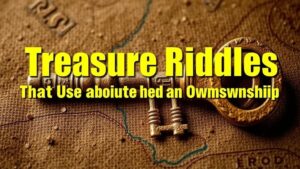Using Deductive Reasoning to Pinpoint Likely Treasure Locations
Using Deductive Reasoning to Pinpoint Likely Treasure Locations
Treasure hunting has long been a pursuit fraught with both excitement and uncertainty. While many enthusiasts rely on luck, employing deductive reasoning can significantly increase the chances of pinpointing likely treasure locations. This article explores how deductive reasoning works in the context of treasure hunting and provides practical applications to enhance efficiency in searches.
Understanding Deductive Reasoning
Deductive reasoning is a logical process wherein conclusions are drawn from general principles or premises. In contrast to inductive reasoning, which derives generalizations from specific instances, deductive reasoning follows a top-down approach. It comprises premises that lead to a specific conclusion, establishing a logical framework akin to a mathematical proof.
For example, consider the premises: All treasures are found in historical sites, and This location is a historical site. The logical conclusion is that This location may contain treasure. This structured thinking facilitates the systematic exploration of areas that are more likely to yield treasure.
Gathering Relevant Information
The first step in applying deductive reasoning to treasure hunting is data collection. This involves gathering historical, geological, and cultural information that can inform the potential whereabouts of treasures.
Some resources for effective information gathering include:
- Historical maps and records: These documents often offer insights into past settlements, trade routes, and areas of significant events.
- Local folklore: Tales of lost treasures or hidden caches can provide leads on where to search.
- Geographical surveys: Understanding the terrain can help narrow down search areas, especially in relation to water bodies or mountain passes–both historically significant for trade.
Formulating Hypotheses
Once sufficient information has been gathered, the next step is to formulate hypotheses regarding potential treasure locations. e hypotheses should synthesize the collected data into actionable insights. For example, if historical records indicate that a merchant lost a valuable shipment near a riverbank during a storm, one can hypothesize that the treasure is buried in that region.
Examples of formulating hypotheses include:
- A merchant trading gold coins in the 16th century likely buried them in proximity to their trading post, which is documented in historical records.
- The existence of pirate raids along a coastline suggests that any buried treasures would likely be near historically documented ambush sites.
Testing and Validating Hypotheses
Testing the formulated hypotheses involves fieldwork and may require the use of tools such as metal detectors, ground-penetrating radar, or excavating equipment. Validation occurs when actual findings, such as artifacts or coins, corroborate the initial reasoning. testing phase is crucial, as it allows hunters to discard invalid hypotheses while refining their focus on more promising leads.
Case Study: The Recovery of the Cazador Shipwreck
A notable example of deductive reasoning in treasure hunting occurred with the recovery of the Cazador shipwreck off the coast of Florida. In 1715, a fleet of Spanish galleons sank during a hurricane, carrying an estimated $400 million in gold and silver. Using historical documents and maritime records, search teams formulated hypotheses about potential wreck locations based on wind patterns and historical shipping lanes.
After comprehensive data analysis, the teams narrowed their search to a limited geographical area. Employing advanced sonar technology and metal detecting, they successfully located several shipwreck sites and recovered an impressive amount of treasure. This successful case illustrates how systematic reasoning can lead to significant treasure discoveries.
Enhancing Your Deductive Reasoning Skills
For treasure hunters wishing to improve their deductive reasoning skills, several strategies are advisable:
- Practice critical thinking: Engage in puzzles and brainteasers that challenge your ability to draw logical conclusions.
- Participate in workshops: Enroll in classes focusing on logical reasoning and historical research to sharpen your investigative skills.
- Collaborate with experts: Joining clubs or organizations can allow interaction with seasoned treasure hunters who can provide mentorship and insights.
Conclusion
Utilizing deductive reasoning in treasure hunting provides a structured and efficient approach to uncovering hidden treasures. By gathering relevant information, formulating hypotheses, and rigorously testing these hypotheses, treasure hunters can significantly enhance their chances of success. Real-world applications, such as the recovery of the Cazador shipwreck, demonstrate the effectiveness of this methodology. With enhanced skills, aspiring treasure hunters can better navigate the exhilarating yet challenging landscape of treasure exploration.
